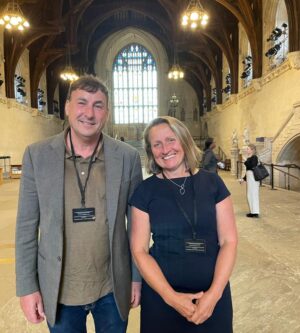
Richard and trustee Suzy spoke in the Houses of Parliament
Richard grew up in care and at aged 18 found himself on the streets, left alone to survive. “I had one aim,” he recalls, “to get to the top of the criminal justice system because I didn’t like society and I wanted to pay it back for what it had done to me.”
Over the following decades a criminal career led to a number of sentences served in prisons in England and Wales. But last month Richard, now in his 50s, was in a very different place. In the grand surroundings of the Houses of Parliament, he was speaking to an audience of MPs, peers and policy-makers.
He was there to share his experiences with an All-Party Parliamentary Group, which was hearing the latest research on how yoga and meditation are helping people in prison.
They heard evidence of how yoga and meditation include practical exercises using your breath and your body to calm the nervous system and help you cope with the challenges you face.
And the challenges are great. Many people in prison suffer from poor mental health, conditions such as autism or have experienced trauma in their lives. Many people in prison witnessed violence in their childhood homes or themselves suffered abuse or neglect.
“Hurt people hurt,” the hearing was told. It also heard how yoga and meditation can help to heal those wounds.
Dr Nora Kerekes, a medical sciences professor at University West, Sweden, explained how there is now significant evidence that yoga eases the mental health symptoms associated with trauma, improves positive emotional states, and reduces negative states that lead to re-offending. She said findings proved that yoga in prison:
- improves impulse control and sustained attention
- decreases antisocial behaviour and negative affect states
- reduces psychological distress levels, paranoid and obsessive thoughts
- increased sense of responsibility, self-acceptance, and self-control
Dr Jamie Bennett, who is chief strategy officer of the Youth Justice Board, said research carried out by neuroscientists at Harvard University described yoga and meditation as ‘weightlifting for the brain’ due to its benefit in developing executive functioning (sometimes referred to as the air traffic control system of the brain).
He referred to The Prison Phoenix Trust’s yoga classes offered to children in custody, including a secure care home holding some of the most complex and vulnerable children in the system. “Yoga and mediation may not be a panacea,” he said, “but it is a credible intervention, which has a place in a Child First youth justice system.”
Former senior manager in the prison service Suzy Dymond-White, who is a trustee of The Prison Phoenix Trust, said: “I firmly believe that yoga and meditation should routinely form part of the regime offer in prisons. The profile should be raised so that more people, in and out of custody, understand the benefits; and decision makers no longer see it as a niche ‘nice to do’ activity but as a fundamental part of improving people’s lives and enhancing their chances of living safely and respectfully within society.”
Yoga and meditation are becoming a Tier 2 activities in 2024 Future Regime Design in prisons.
